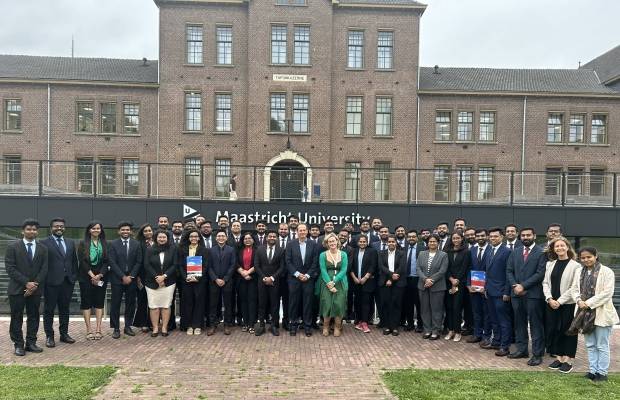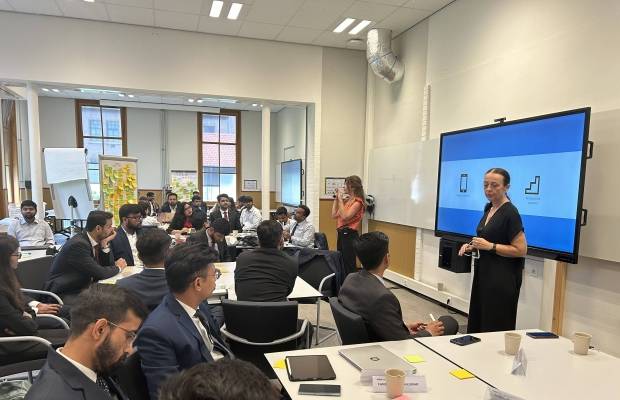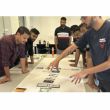Interactive sustainability programme at MSM: A transformative experience for IIM Lucknow students
From 02 September to 13 September 2024, Maastricht School of Management (MSM) once again had the pleasure of hosting a dynamic group of over 40 MBA students from the Indian Institute of Management, Lucknow (IIM Lucknow). Building on the success of previous years, this year’s programme was designed to enhance the students' understanding of sustainability within the broader context of global business management.
Sustainability at the Core
The programme provided an in-depth look at sustainability from both theoretical and practical perspectives. The students delved into topics such as Corporate Social Responsibility, sustainable urban development, smart cities, sustainable finance and investments, and AI design thinking.
Among the key workshops was the Climate Fresk Workshop, a highly interactive session facilitated by students from the Maastricht University Green Office. The Climate Fresk workshop is designed to educate participants on climate change and its systemic impacts. Using a collaborative approach, students worked together to analyse and discuss climate challenges, gaining a deeper understanding of how businesses can respond to global environmental issues.
Mr. Ashish Kumar Jha reflected on his experience, saying: “The climate fresk workshop was the most outstanding activity in the whole programem because it addressed the issue of climate change related awareness which is a crucial step in devising pro-planet policies worldwide.
Mrs. Anubha Singh added: “The Climate Workshop really stood out for me. Although I study sustainable management, the workshop pushed me to think more deeply about the causes and consequences of each human activity. It was a powerful exercise that broadened my perspective on the interconnectedness of environmental impacts.”
Another highlight of the programme was the Design Thinking for New Products and Services workshop by Dr. Mihaela Popescu and Dr. Adriana Seclaman. This hands-on session focused on innovation through AI-powered tools, guiding students through the process of brainstorming, prototyping, and refining product ideas. Using a human-centric approach, students learned to solve complex problems and create user-focused solutions, key skills in today’s fast-evolving business landscape.
Mr. Akshar Thakkar shared, “We study design thinking as part of our curriculum, but an exercise to apply the concepts of design thinking amalgamating with AI and coming out with a shoe product to meet certain needs of a consumer was fascinating. The exercise helped us understand the importance of teamwork and the inclusion of diverse perspectives, which are often required to foster creativity and innovation.”


Practical Learning through Field Visits
The programme extended beyond the classroom with field visits to leading companies such as Nedlin and Gulpener Bierbrouwerij. The students also visited the European Parliament in Brussels and concluded the programme with a Sustainable Tour of Amsterdam. These visits offered the students a first-hand look at how sustainability drives innovation and shapes business strategies across various industries.
Mr. Apoorv Ranjan, reflecting on the field visits, said, “Visiting companies like Nedlin and Gulpener Brewery brought the concept of sustainability to life. At Nedlin, a leader in industrial textile cleaning, I saw how they are incorporating circular economy principles by reducing water and energy usage in their processes. This visit highlighted the tangible steps companies can take to minimize their environmental impact while maintaining operational efficiency. At Gulpener Brewery, the focus on local sourcing and renewable energy underscored the importance of sustainable production in the food and beverage industry. Their "From Grain to Glass" philosophy, which involves using local ingredients and reducing carbon emissions, showcased a practical approach to running an eco-conscious business.”
Another participant, Mrs. Anubha Singh, was particularly impressed with the European approach to sustainability: "The field visits to Dutch companies not only deepened my understanding of sustainable business practices but also allowed me to draw comparisons with practices in India. Coming from a manufacturing background, I was particularly impressed by Nedlin’s initiative to regulate temperatures on the shop floor for the well-being of their employees. Additionally, Gulpener's approach to sourcing materials locally and adopting local endangered animals as their mascot to promote conservation efforts showcased their commitment to sustainability in operations and community engagement.”
Asking the students about their main takeaways from the immersion programme they answered:
“My first international trip aligned with the Immersion Program at Maastricht School of Management, offering a blend of academic and practical experiences. The class discussions on decentralisation and sustainable finance were particularly insightful. I was also deeply impressed by the Dutch emphasis on hospitality and sustainability, particularly how waste segregation was consistently practised during our coffee and lunch breaks.” According to Mrs. Anubha Singh
Mr. Akshar Thakkar noted: “The main takeaways from the Immersion Programme at MSM were firstly that you can sustainable yet profitable, the general population is aware and conscious about sustainability and takes great effort to maintain it that way. The behavioural responsibility towards the plant was the biggest takeaway from the program. The learnings from the professors were immense and diversity of session topics were brilliantly done.”
Mr. Apoorv Ranjan added: “The immersion program at Maastricht School of Management offered a holistic perspective on global business practices, with a strong emphasis on sustainability and innovation. One of my key takeaways was understanding the integration of sustainable development into core business strategies with examples like Tony Chocolonely.”
Maastricht: A Cultural and Educational Experience
For many students, the city of Maastricht itself played a significant role in their overall experience. The city’s rich history, coupled with its commitment to sustainability, created the perfect environment for this immersive educational programme.
“Maastricht is a lovely city both in terms of it's medieval architecture and convenient connectivity to Germany and Belgium. noted Mr. Harshanth R. “Having traveled to multiple places across Europe and Scandinavia, I can say for sure that Maastricht is one of the best cities to explore (albeit expensive)! I would recommend anyone planning to visit Europe to start with Maastricht as we did.”
Mr. Kumar Ankur added, “The sustainable city tours in Amsterdam and Maastricht were eye-opening. From adaptive reuse projects like the NDSM shipyard to green initiatives like Amsterdam’s underground bike park, these visits highlighted how cities can innovate to reduce emissions and enhance quality of life.”
In summary, the Immersion Programme offered by Maastricht School of Management has once again proven to be an enriching experience, providing IIM Lucknow students with the tools, insights, and real-world exposure needed to integrate sustainability into global business strategies.

